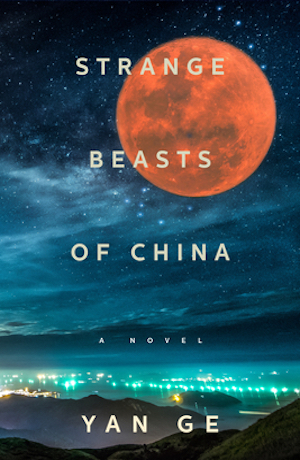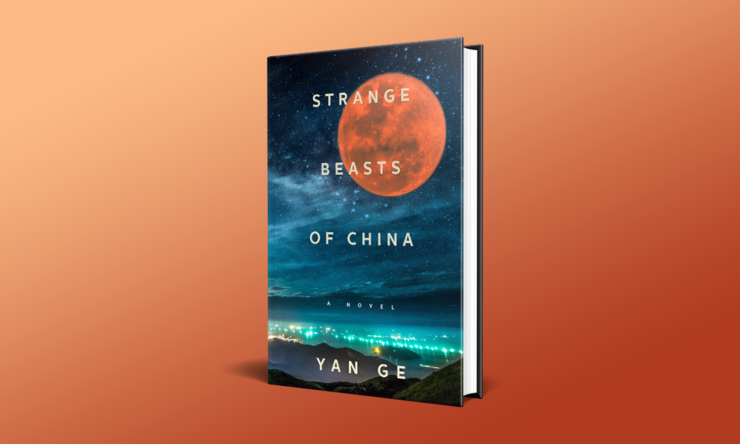As a diaspora Chinese reader, plumbing the depths of Yan Ge’s Strange Beasts of China, translated to English by Jeremy Tiang, is at once warmly familiar and exhilaratingly alien. Set in a fictionalized version of Yong’an city (or perhaps, it seems a pseudonym for an archetypal anycity), somewhere in an alternate dimension, it tells a beautifully-threaded story of Yong’an’s titular beasts through the eyes of a zoologist-turned-novelist with a penchant for booze and impulsive decisions.
The beasts of this world are very much like humans with small, nearly-invisible differences—a webbed foot here, a furred palm there. Some have gills and low-hanging jagged earlobes. Impasse beasts have long, stringy hair and a rather shrimpish appearance, while flourishing beasts begin their lives as rare plants and bear the likeness of those who tended them. Thousand league beasts have the gift of foresight, and all its attendant miseries. The humans of Yong’an have fetishized many of these beasts, as people are wont to do, and turn to the unnamed protagonist’s weekly newsletter column for sensational insights into their lives; Yan Ge’s prose shines as she layers a well-crafted meta-narrative about otherness—beastliness—over the small, short lives of human Yong’an society.
Of course, Strange Beasts of China isn’t really about these fantastical creatures, but about people, human behavior, and what we think of as quintessentially human characteristics. Throughout each chapter, we’re introduced to a new type of beast as the protagonist peels back layers of her own life to examine what lies within. Each tale swells with an ambient sense of dread as she seeks answers to questions that perhaps simply shouldn’t be answered. Between serene scenes of mundane everyday life—reading the newspapers in bed, nursing a hangover with homemade millet porridge—are beautifully-crafted vignettes of the beastly realm, which differs among each tribe and species.
Buy the Book


Strange Beasts of China
It seems that our protagonist also has a habit of “taming” beasts, bringing them into her home, domesticating them, arranging a distinctly practical Chinese relationship with them where she gets fed and tended in return. It’s unclear whether these arrangements are necessarily sexual, but it doesn’t matter (some beasts simply can’t mate with humans). Her small journeys through each revolving door of intimacy speak to a larger message about love—she does, after all, frame many of her newspaper stories around romances, much to the chagrin of her friend Zhong Liang.
While most of the beasts seem to be creatures of nature, heartsick beasts—created in labs where they wait for a new owner to take them home and mold them in a specific likeness—hit eerily close to home in a time when we tread dicey waters with genetic testing and manipulation. “Heartsick beasts have an outsize ability to foster morality and develop intellect, and any child growing up in the company of one is sure to become a pillar of society,” notes our protagonist, ever mindful of Yong’an’s class hierarchies and social strata. Still, these docile beasts still haven’t drawn the shortest straw of the lot—others are far more obvious, long-suffering victims of systemic human manipulation and exploitation.
Yan Ge walks a masterful balance between economy and emotion—each sentence is exactly what it needs to be, nothing more, nothing less. It makes for a magnetic reading experience, especially coupled with the short anthropological coda of each chapter that ties in with the protagonist’s formal training in zoology. For someone so well-versed in beastliness, she’s also an expert at avoiding her own inner monsters, which is easy in a huge city like Yong’an. “Each day in this city there were five hundred and thirteen traffic accidents,” she writes, “three hundred and twenty-eight migrant workers leaping to their deaths, seventy-eight cases of food poisoning, fifty-two rapes, and countless other suicides and attempted suicides. We never heard about the stories that didn’t make it to the news—and those we did know about were never anything to do with us.”
This is, perhaps, the heart of Strange Beasts—the idea that we are all, to varying degrees, essentially unknowable in a constantly-changing cityscape of strange new faces. We cling to our protagonist’s regular haunts—her cozy apartment in an “up-and-coming” neighborhood, the Dolphin Bar where she shares an unspoken camaraderie with the bartender, her memories of her beloved professor’s lab at Yong’an University. Maybe these places are all we can really know about her, even as she sheds more layers around her own identity. Finally, as she acknowledges her own fear of loneliness, the novel reveals its heart as a peculiar but moving love story.
Strange Beasts of China is both a record and a reckoning. It’s a story that stays with you long after you finish turning its pages, especially its evocative descriptions of its beastly inhabitants and the protagonist’s semi-cryptic inner monologues that illustrate the beauty of sometimes not knowing—or choosing not to know.
Strange Beasts of China is published by Melville House.
Alexis Ong is a freelance culture journalist with weak ankles who mainly writes about games, tech, and pop culture. Her work has appeared in The Verge, Polygon, Kotaku, Rock Paper Shotgun, VICE, Dazed Digital, and more; soft spots include science fiction, internet archaeology, comics, boxing, and old games. You can find her at her website or on Twitter.










